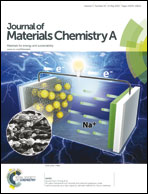Incorporation of a [Ru(dcbpy)(bpy)2]2+ photosensitizer and a Pt(dcbpy)Cl2 catalyst into metal–organic frameworks for photocatalytic hydrogen evolution from aqueous solution†
Abstract
A molecular photosensitizer [Ru(dcbpy)(bpy)2]2+ (dcbpy = 2,2′-bipyridyl-5,5′-dicarboxylic acid) and a proton reduction catalyst Pt(dcbpy)Cl2 were successfully incorporated into a highly robust metal–organic framework (MOF) of Zr(IV)6O4(OH)4(bpdc)6 (bpdc = 4,4′-biphenyldicarboxylic acid) by making use of a mix-and-match approach. The molecular integrity of the Ru and Pt complexes within the MOFs was demonstrated by a variety of techniques, including XRD, BET, TGA, SEM, TEM, HAADF-STEM, EDX, DRUS and XPS. This di-component Ru–Pt@UIO-67 MOF assembly allows a facile arrangement of the photosensitizer and the reduction catalyst with close spatial proximity, promotes the electron transfer between them, and thus leads to a significantly improved hydrogen evolution activity in aqueous solution at pH 5.0 upon visible light irradiation. This Ru–Pt@UIO-67 system represents the first example of MOFs functionalized with two different transition metal complexes, which can be used as a photosensitizer and catalyst, respectively, for hydrogen generation from water.
![Graphical abstract: Incorporation of a [Ru(dcbpy)(bpy)2]2+ photosensitizer and a Pt(dcbpy)Cl2 catalyst into metal–organic frameworks for photocatalytic hydrogen evolution from aqueous solution](/en/Image/Get?imageInfo.ImageType=GA&imageInfo.ImageIdentifier.ManuscriptID=C5TA01135C&imageInfo.ImageIdentifier.Year=2015)

 Please wait while we load your content...
Please wait while we load your content...